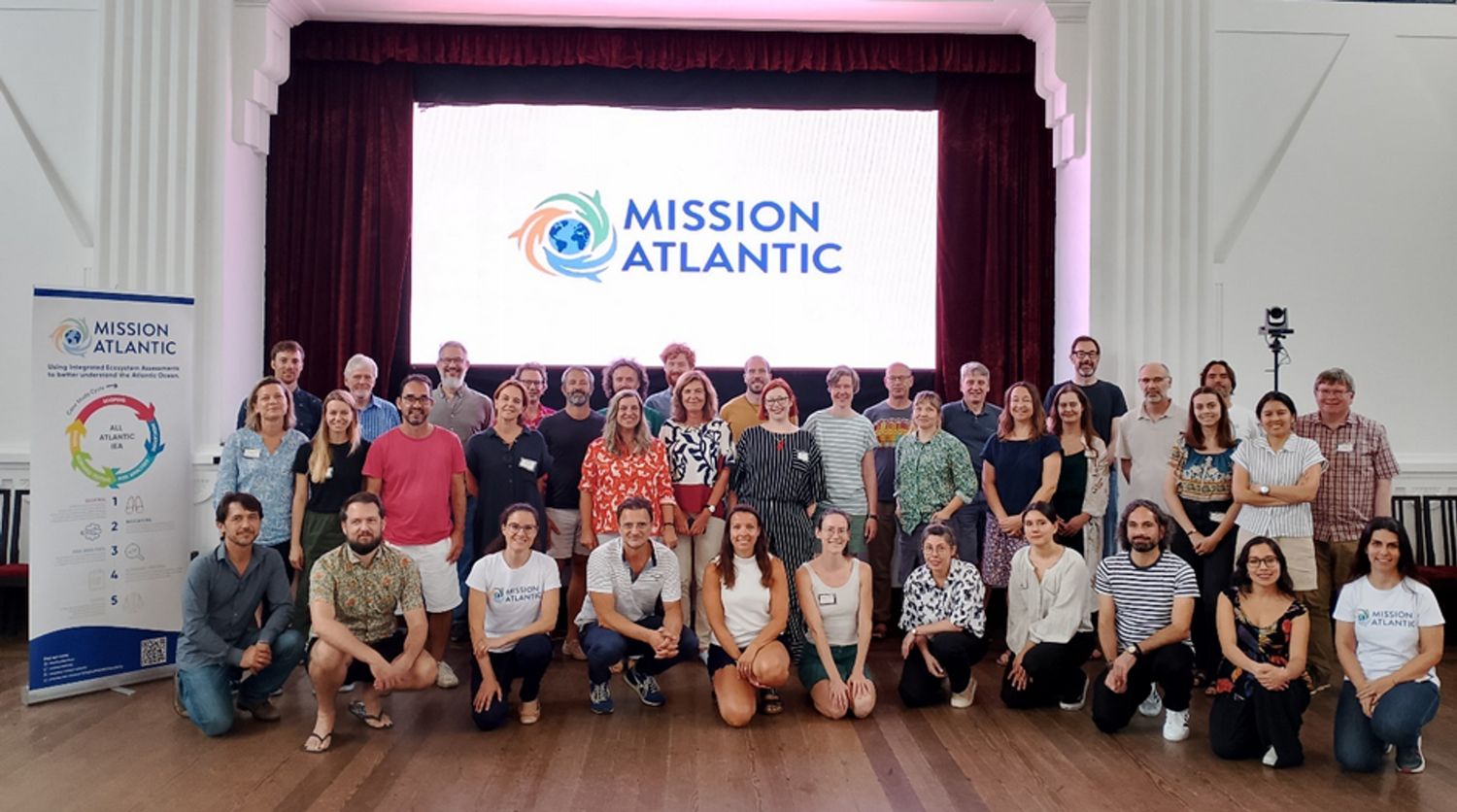By Caecilia Managò, ERINN Innovation
The forth Mission Atlantic General Assembly took place on 23rd – 27th September 2024 at Sociedade Amor da Pátria, Horta, Faial Island, Azores, Portugal.
We had the honour to hold scientific presentations, discussions, workshops and a Policy Forum in the beautiful Art Deco style landmark building, designed by the architect Manuel Joaquim Norte Júnior, one of the most prominent Portuguese architects, inaugurated on June 30, 1934. Beautifying the city it is home to, with its originality and sumptuousness, it was classified as a "Property of Public Interest" in 1984. This magnificent space has welcomed Presidents of the Republic, Ministers and other high-ranking civil and religious dignitaries and artists of national and international renown at various times and periods.
The MISSION ATLANTIC General Assembly was an important opportunity for the partners from the adjacent continents framing the Atlantic Ocean, to discuss the key actionable research findings, with a view to transfer these in the upcoming last year of the project to foster uptake, application and impact.
The first day, 23rd of September, focused on MISSION ATLANTIC (MA) project management. This included a welcome and overview of MA activities between 2023 and 2024 by Patrizio Mariani, MA coordinator and Gonzalo Garcia de Arboleya, EC Project Officer; a briefing on coordination and management by Nertila Gojani, MA management team, followed by presentations on the progress and deviations from the MA Work Packages (WP).
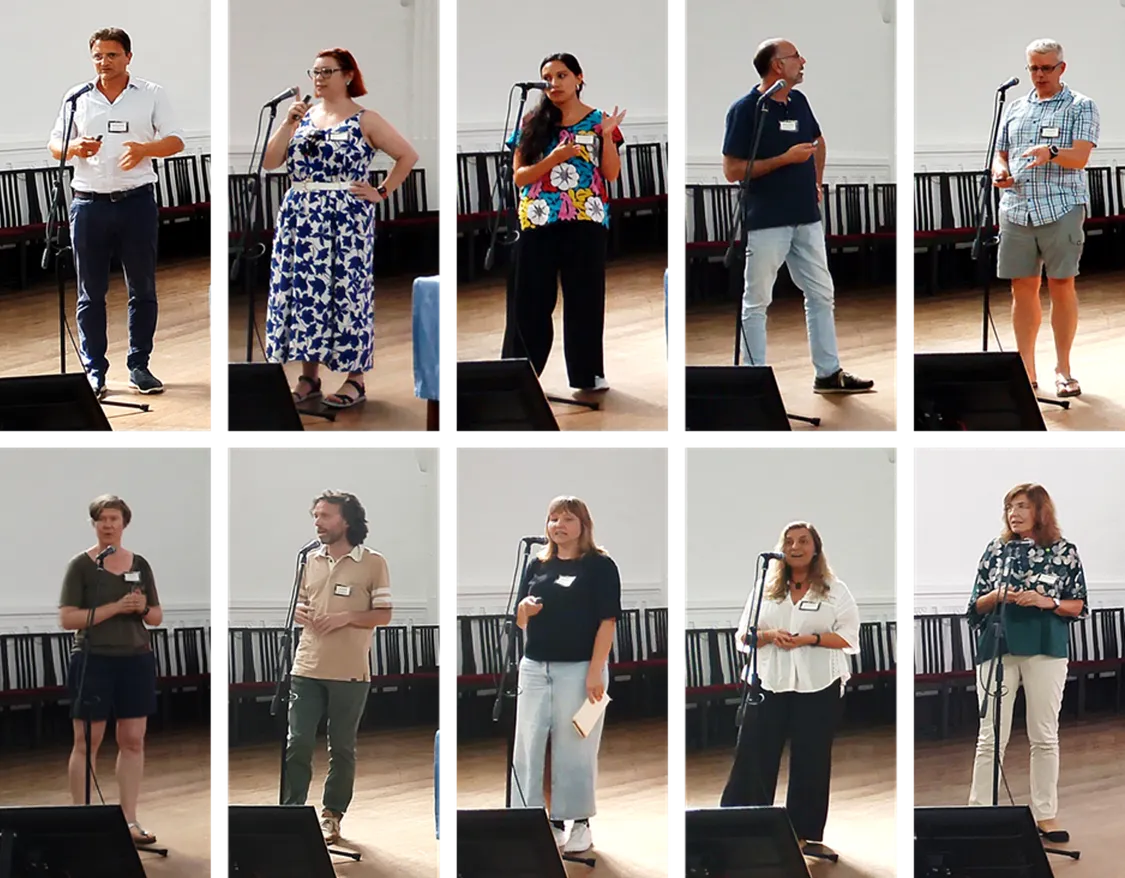
Patrizio Mariani (Coordinator, DTU), Debbi Pedreschi (WP1, MI), Laura Marques (WP2, VLIZ), Guillem Chust (WP3, AZTI), Thomas Furey (WP4, MI), Saskia Otto (WP5, UHAM), Yuri Artioli (WP6, PML), Susa Niiranen (WP7, SU), Mary Gasalla (WP8, USP), Isabel Sousa-Pinto (WP9, Ciimar-UPO).
The 10min short presentations covered progress and deviations from all WP, upcoming deliverables and milestones, upcoming important dates; events and publications, deviations and next steps.
Day 2 was focused on the topic of ‘Atlantic Ocean assessments, healthy ocean and biodiversity’ with scientific presentations on Project Outputs:
- Keynote A: 'Mapping ecosystem components to assess spatial extent of cumulative impacts' by Kerry Howell, University of Plymoth
- 'Seascape connectivity shapes biodiversity turnover in warming seas' by Guillem Chust, AZTI.
- 'Causal modelling of climate-fish-fisheries. Confronting conceptual models with data' by Benjamin Planque, IMR
- 'Climate change vulnerability to marine ecosystem services in the Atlantic Ocean' by Climate change vulnerability to marine ecosystem services in the Atlantic Ocean by Zoe Jacobs, NOC
- 'Predicting range shifts in Vulnerable Marine Ecosystems in the North Atlantic' by Julian Burgos, MFRI
- 'Climate change impacts on the distribution and abundance of two tuna species (skipjack and albacore) and their preys' by Laurene Merillet, CLS
- 'Going forward: new opportunities for IEA to manage impacts from shipping' by Mary Wisz, WMU
- 'A new long-term seafloor monitoring platform - a hybrid approach' by Ralf Bachmayer, MARUM
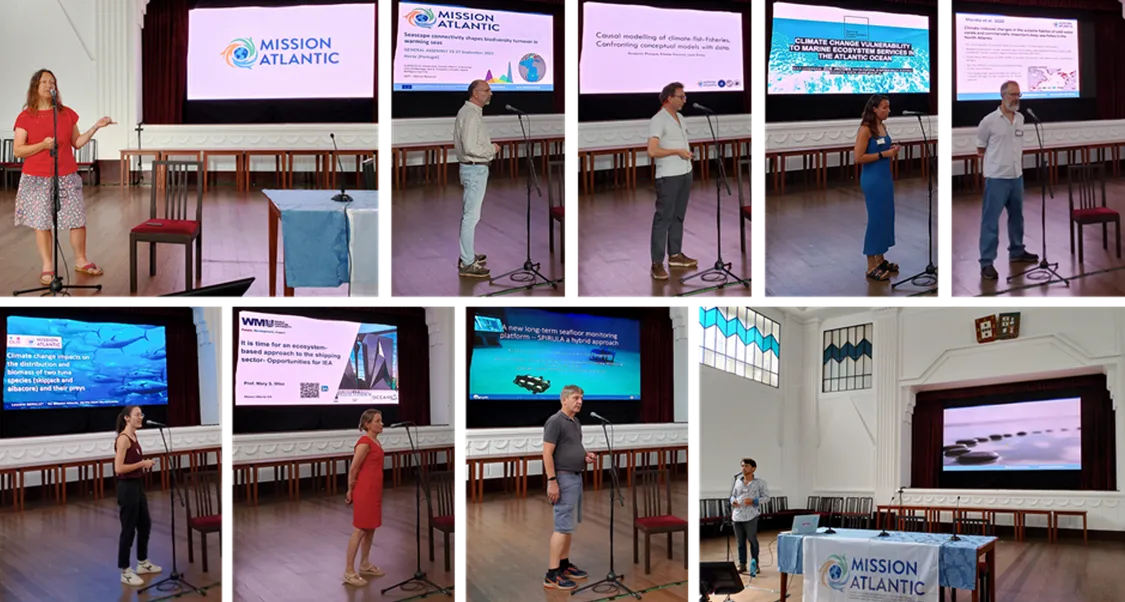
Kerry Howell (University of Plymoth), Guillem Chust (AZTI), Benjamin Planque (IMR), Zoe Jacobs (NOC), Julian Burgos (MFRI), Laurene Merillet (CLS), Mary Wisz (WMU), Ralf Bachmayer (MARUM), Ivo Grogorov (DTU)
On Day 3, the MISSION ATLANTIC Policy Event on ‘ECOSYSTEM BASED MANAGEMENT AND THE RESILIENCE OF COASTAL SOCIO-ECOLOGICAL SYSTEMS: THE ROLE OF MARINE MEGAFAUNA’ took place, with the aim to strengthen a shared understanding of an Ecosystem Based Approach to marine research and management in the Atlantic Ocean. The discussion focused on this all-encompassing topic, through the lens of highly migratory, charismatic megafauna, as a driver and indicator of coastal socio-ecological systems resilience. This way, changes in the marine environment were explored, and how these changes entail local, regional and basin scale social, economic and biodiversity consequences. It was highlighted that "Local Science is crucial to inform the EU Biodiversity Strategy for 2030, aiming to protect 30% of the oceans, as well as for the Marine Protected Area design process"
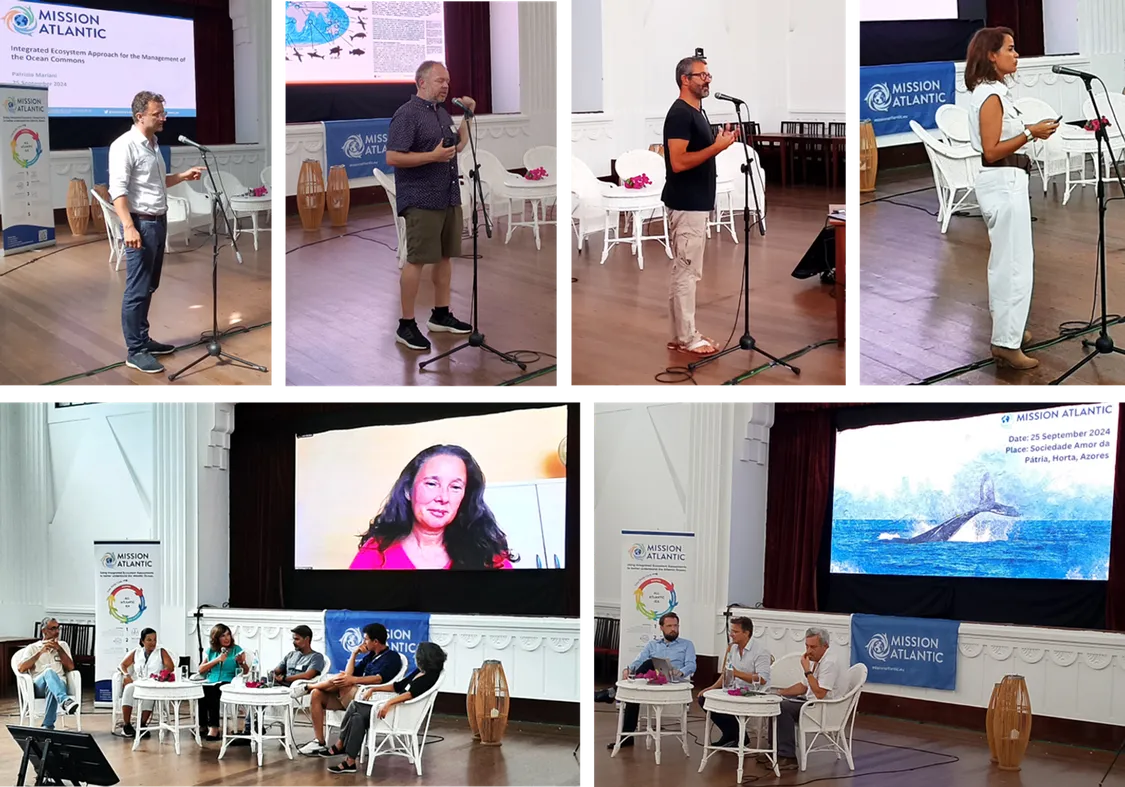
Patrizio Mariani, Professor, Technical University of Denmark (DTU)/ Coordinator Mission Atlantic; Elliott Hazen, Professor, University of California, Santa Cruz; Pedro Afonso, Researcher, Institute of Marine Research (IMAR) & Institute of Marine Sciences OKEANOS; Adriana Ressurreição, Researcher, CCMAR Center for Marine Sciences; Round Table discussions.
This exploration furthermore uncovered how the All-Atlantic Ocean Research and Innovation Alliance can strategically support policy development at all scales of jurisdiction. An aspect highlighted was the "need to foster both, specialists and generalists with the capacities for multidisciplinary work ahead of us and need to provide the corresponding professional opportunities".
See the full agenda and speakers HERE. Watch the full recording of the Policy Event HERE.
Day 4 was focused on the topic of ‘Digital Ocean’ with scientific presentations on Project Outputs:
- Keynote B: ‘Big ocean data processing and contribution of MISSION ATLANTIC to the Digital Ocean Twin' by Patrizio Mariani (DTU)
- ‘Projecting the impacts of climate change in the Atlantic Ocean: a global ocean model downscaling approach' by Anna Katavouta (NOC)
- 'Variability of climate change impacts on the Atlantic Ocean ecosystem' by Yuri Artioli (PML)
- ‘EDITO overview and DataLab’ by Lennart Schepers (VLIZ), covering Frederic Leclercq (VLIZ)
- ‘The MISSION ATLANTIC GeoNode data portfolio' by Tim Collart (SEASCAPE)
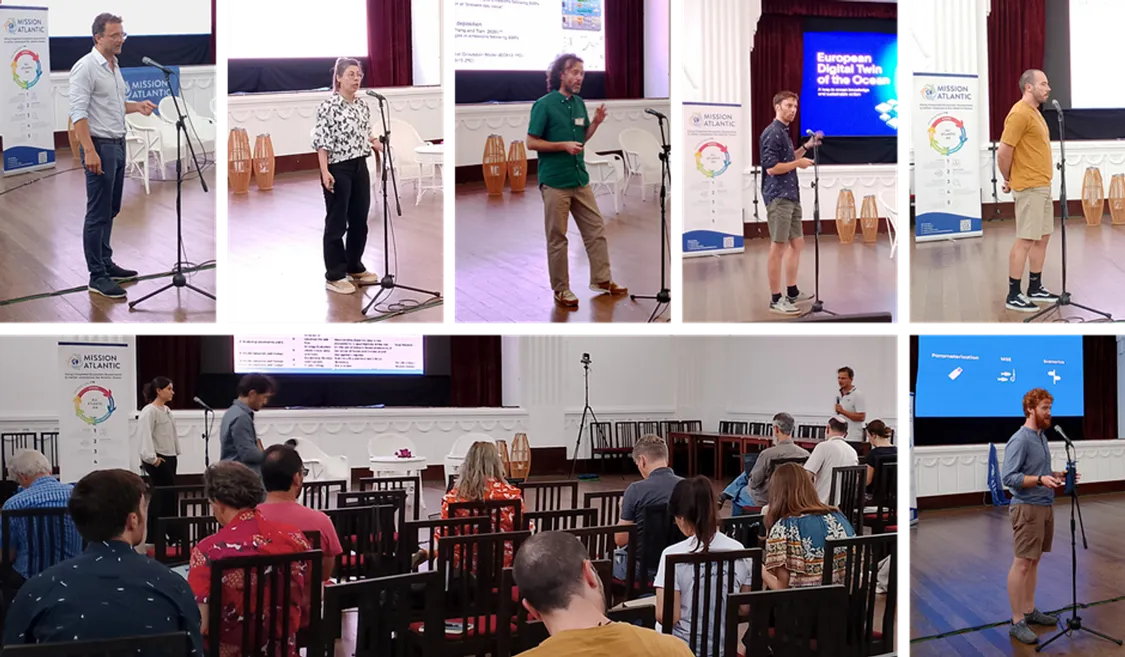
Patrizio Mariani (DTU), Anna Katavouta (NOC), Yuri Artioli (PML), Lennart Schepers (VLIZ), Tim Collart (SEASCAPE), Alondra Sofia Rodriguez (ICES), Jack Laverick (University of Strathclyde)
This was followed by a workshop on recordings for the Online Training by Alondra Sofia Rodriguez (ICES) and a STRATHE2E Demo- Including Case Study discussion by Jack Laverick (University of Strathclyde). Day four was finalized with break-out sessions, A: Risk and vulnerabilities Session steered by Susa Nira (SU) and B: Exploitation initiatives and All Atlantic and FORUM steered by Isabel Sousa Pinto (UPO-CIIMAR) and Caecilia Managò (ERINN).
Day 5 was chaired by Patrizio Mariani (DTU), entailing an open discussion on MISSION ATLANTIC achieving impact, including an Introduction, the way forward, agreement on the exploitation and dissemination plan, potential policy briefs as well as how to advance tools and products and priorities.
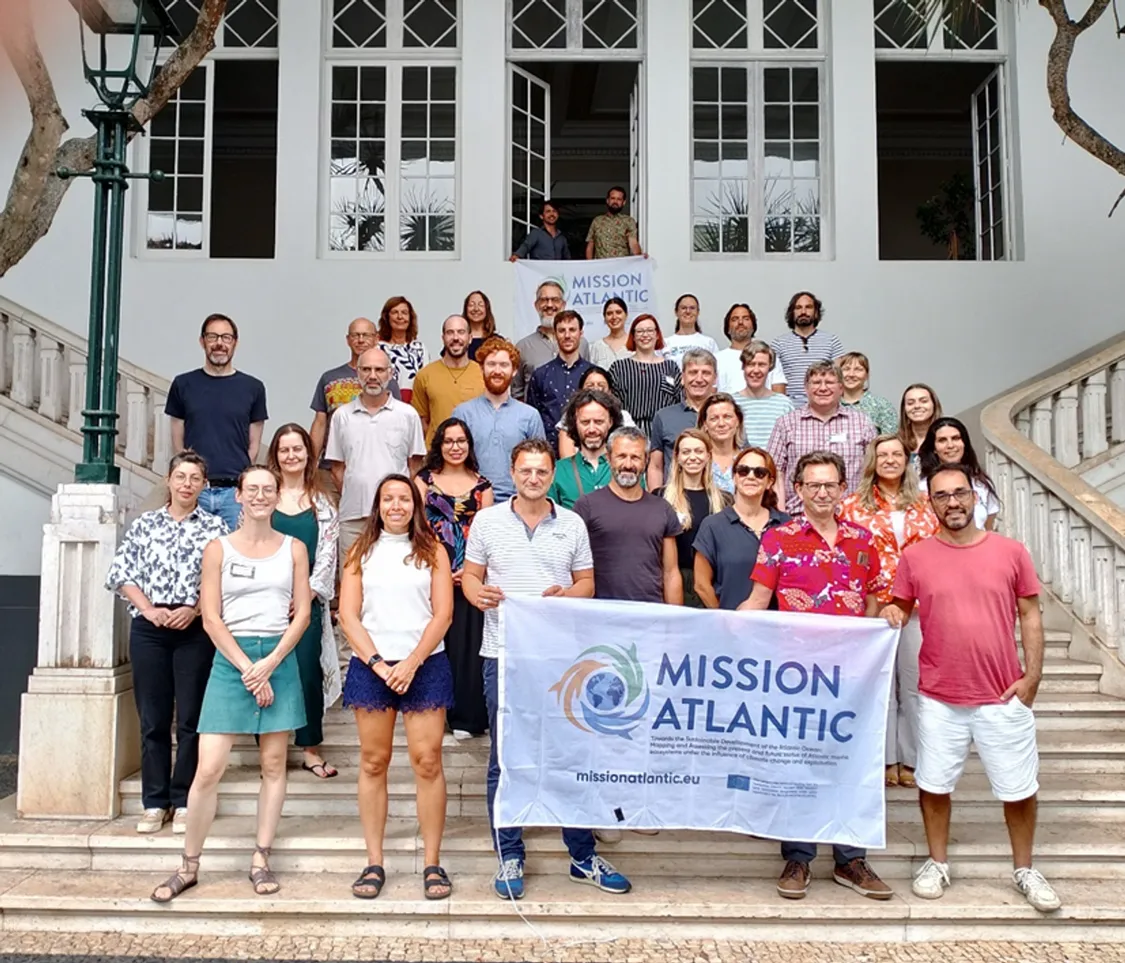
We warmly thank OKEANOS - Instituto de Investigação em Ciências do Mar, Universidade dos Açores, for the fantastic organisation, the warm hospitality, as well as the people from the Azores for the amicability!
